
Brian Mefford explores Nadiya Savchenko’s popularity in Ukrainian politics. First Published in GlobalUkraineNews.
The release from a Russian prison and return of Air Force pilot Nadia Savchenko to Ukraine has ignited speculation on her future political plans. Elected #1 on the party list of the Bloc of Yuliya Tymoshenko in the October 2014 Parliamentary Elections, Savchenko returns to Ukraine and immediately enters a political career. Savchenko’s initial speeches upon her return focused primarily on the war in the Donbass. Savchenko noted that the Minsk Agreements “put out the flames” in the Donbass war but she did not consider them effective enough. About possible elections in the Donbass, Savchenko said,
“The elections cannot be held now as the Ukrainian border is not plugged…If there were only the people of Ukraine, we would find common ground between each other. We’ve got too many advice givers, and we won’t be allowed to think on our own…Until we, Ukrainians, start to think and decide for ourselves, the elections are impossible”.
More specifically about her personal ambitions, Savchenko even went as far as to state, “
“Ukrainians, if you want me to be President- well, I’ll do it”.
However she quickly doused the flames by adding that she doubted that Ukrainians have learned “not to vote for buckwheat”. In short, the future is wide open for Savchenko, but the results will depend upon her choices.
The return of Savchenko sparked a political tug of war between the President and former Prime Minister Yuliya Tymoshenko. Savchenko and Poroshenko held a joint press conference on Bankova Street in front of the Presidential Administration upon her release. President Poroshenko and his team had been working for Savchenko’s release for almost two years and succeeded in not only winning her release (in exchange for two Russian spies), but making her an international cause worth supporting. Poroshenko relished the moment and announced,
“We will return Crimea and the Donbass under Ukrainian sovereignty as we have returned Nadia”.
Poroshenko then awarded Savchenko the “Hero of Ukraine” Award for her “indestructibility”. Savchenko graciously accepted the award and agreed to the appearance, despite some frustrations with the Poroshenko administration over their negotiations for her release. Meanwhile Yuliya Tymoshenko seized the occasion in an attempt to win political points, just as she did with the privatization of Krivorizhstahl in 2006. In that case, President Yushchenko had orchestrated the nationalization and re-privatization of Krivorizhstahl in a transparent manner, only to have Tymoshenko pop up at the sale to shake the hand of the Mittal Steel CEO (the winner of the tender) and claim credit for the effort. However, Tymoshenko’s charm and timing may be declining with age, as her attempt to give Savchenko a sisterly hug and a bouquet of flowers, were rebuffed in favor of a soldierly handshake instead.
While Savchenko may not be big on hugs and flowers, she remains a soldier. As a result, she did appear at a press conference at the Motherland Party headquarters in the presence of several Motherland Faction MP’s the next day. Savchenko also promptly joined the Motherland Faction in Parliament during the first plenary meeting she was able to attend. For the time being, Savchenko will remain in Motherland. As the old Ukrainian proverb says though, “there cannot be two cooks in one kitchen”. Yuliya Tymoshenko gets high marks for being a cunning politician, but has never been known to share the spotlight with others. It remains to be seen how long this relationship will last. One factor that prevents Savchenko from being an independent and leading her own reform movement, is the recent Law #3700 and enforcement of Article 81 of the Ukrainian Constitution. These two provisions stipulate that MP’s elected from the party list can be expelled from Parliament and lose their mandates at the party’s will. Longtime MP and former Deputy Premier Mykola Tomenko, as well as Parliament’s youngest Member Egor Firsov, were the first two victims of this heavy handed, Soviet era tool. Thus, if Savchenko quit the Motherland faction, Tymoshenko could have her expelled from Parliament immediately. Granted, it wouldn’t help Tymoshenko’s rating, but it is not likely to hurt it either as the veteran politician has a hardcore 13% of the electorate at her disposal.
It is inevitable that polls will soon be released showing Nadia Savchenko as the most popular politician in the country. This will de facto benefit Motherland and Tymoshenko too. While snap Parliamentary elections are not likely until at least next summer (unless the current Parliamentary majority collapses), there are seven vacant Parliamentary districts up for grabs in special elections on July 17. While Motherland won just two single mandate districts in the 2014 Parliamentary Election (when it received 5.5% nationwide), it did win 39 seats in the 2012 Parliamentary Elections (when it received 26% nationwide). This demonstrates that when Motherland’s rating is high, it can win individual districts. While Motherland received just 5.5% of the vote in 2014, its’ current average rating is around 16%. The addition of Savchenko will certainly increase Motherland’s support. If Savchenko actively campaigns for Motherland candidates in these seven districts, it will be an early indicator of her popularity and its’ effect on the electorate. It has already been reported that Nadia’s sister Vira is planning to be the Motherland candidate in Ivano Frankivsk District #85 (Kalush). Clearly Nadia will be campaigning for her there, but if she also gets behind Motherland candidates in Volyn, Poltava, Chernihiv and elsewhere, that will be the real test of her political impact.
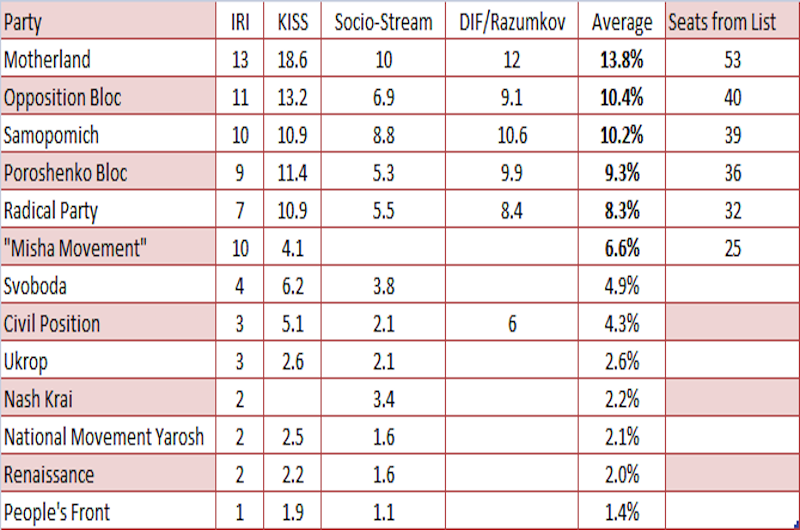
Current Poll Averages and Projected Numbers of Seats from the Party List Ballot
While the addition of one person who doesn’t head a party can be helpful, its impact tends to be short term and limited. Nonetheless, with the return of Savchenko, what if snap elections for Parliament were held today? According to the averages of recent polls, Motherland is leading the field with almost 14%. They are followed by Opposition Bloc and Samopomich both at 10%. Poroshenko Bloc follows with 9%, Radical Party with 8% and the “Misha Movement’ (Saakashvili) passes the barrier with almost 7%. Assuming that there are no net changes in the number of MP’s elected from districts, that would leave the Poroshenko Bloc the largest in Parliament with 115 members, followed by Motherland and Opposition Bloc with 55 each. Samopomich and Radical Party would increase to 40 and 32 members respectively and Saakashvili’s new party would have 25 MP’s.
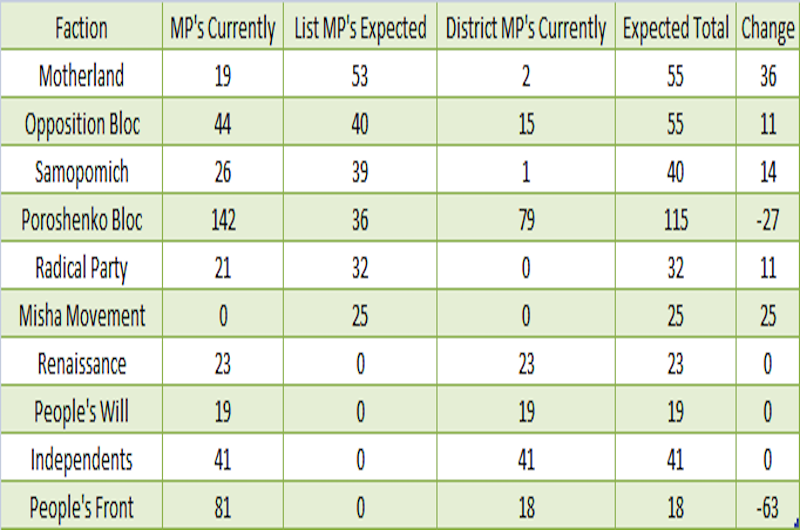
Projection of Seats in the Next Parliament based on Current Polling & Districts
However, if we add five percent to Motherland’s vote total to compensate for the “Savchenko effect”, then Motherland’s influence increases. This would give Motherland 69 seats in Parliament, making it the second largest faction after the Poroshenko Bloc at 112. Opposition Bloc would be third with 52 Members. Former coalition partners Samopomich and Radical Party would have 37 and 29 MP’s respectively, followed by Saakashvili’s party with 23 MP’s.
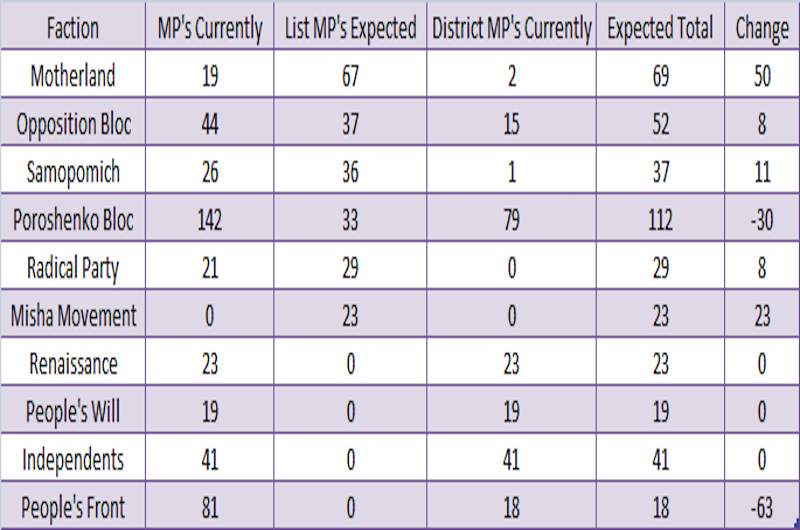
Projected Seats in Parliament if Motherland gets a 5% Rating Boost from the “Savchenko Effect”
If we add ten percent to Motherland’s rating to compensate for the “Savchenko effect”, then the party increases to 80 seats in Parliament. In effect, it would have the statistically the same strength as People’s Front has in the current Parliament. Poroshenko Bloc would remain the largest, but be trimmed to 110 members. This scenario would essentially pave the way for a potential Tymoshenkoreturn as Prime Minister. Thus, accommodating Savchenko is in Tymoshenko’s short term interests, even if it means sharing the political spotlight. The third coalition partner would come from the ranks of Samopomich with 34 members, Radical Party with 27 members or Saakashvili’s team with 22 members.
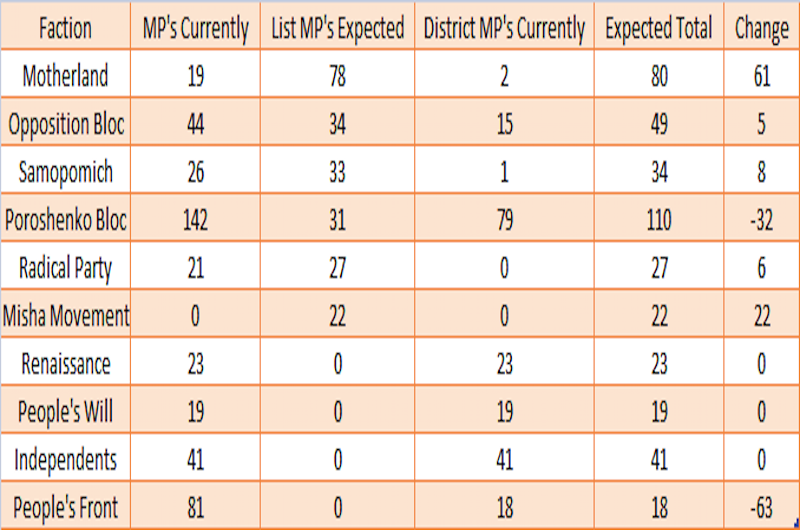
Projections on Seats in Parliament with a 10% “Savchenko Effect” on Ratings
However it is likely that if Motherland increases their support to between 19-24% nationwide, that would also reflect victories in single mandate districts too. Therefore in this scenario we assume that People’s Front will collapse and lose 75% of their single mandate deputies (likely since they will not pass the five percent barrier on the party list ballot), and Poroshenko Bloc will lose 25% of theirs with Motherland candidates replacing them. In this case, even a five percent “Savchenko effect” is enough to give Motherland the largest faction in Parliament with 103 members compared to Poroshenko Bloc’s 92. If the “Savchenko effect” is ten percent, then Motherland gets 112 members versus Poroshenko Bloc’s 90. In such a case, Tymoshenko would have even more claim to the Prime Minister’s post since she would have the largest faction in Parliament.
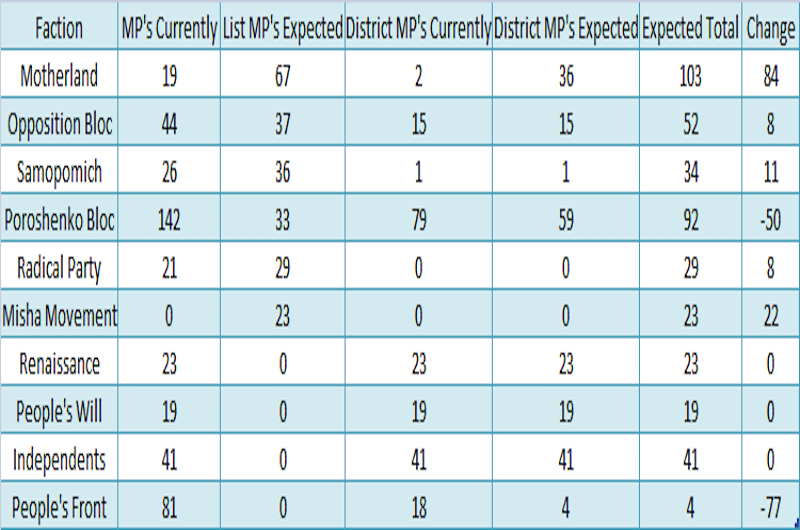
Projection of Seats in Parliament with a 5% “Savchenko Effect” in the polls and collateral effect on districts
Thus, snap Parliamentary elections are in Tymoshenko’s interest – sooner rather than later. In the meantime, the “Savchenko effect” will be tested in the seven Parliamentary districts on July 17th. Victories in one more of those seats will shake up the political scene in Ukraine and be a bell whether of future elections.
The Reform Party and Too Many Chiefs: Former Deputy Prosecutor General David Sakvarelidze announced that Odesa Governor Mikheil Saakashvili will finally form his long awaited political party in Ukraine. The “Misha Movement” has been talked about for months as a possible reform vehicle, but has been slow to launch. While polls already show enough support for the “yet to be named” party to win seats in the next Parliamentary election, the party has been hindered by its inability to attract non-Georgians (and foreigners) to the effort. German citizen Sasha Borovik and Russian citizen Masha Gaydar both recently resigned their government posts in Odesa due to a new civil service law. To date, not a single high ranking Ukrainian official or leader has joined the Saakashvili team.
At the end of April, negotiations were held among Saakashvili, Poroshenko Bloc reformers Serhiy Leshchenko and Mustafa Nauyem, independent MP Hanna Hopko, recently expelled MP Egor Firsov, Vasyl Hatsko the Chairman of the Democratic Alliance political party, Valentin Nalyvychenko’s Clean-Up Ukraine NGO, and representatives of the some minor, reform oriented political parties. While all individuals and organizations could agree on the need for reform, negotiations broke down over who would lead the effort. Saakashvili, with his experience as the former President of Georgia, believed he should be the head. However other such as Leshchenko believed that a Ukrainian should be the leader. Thus, for the time being, there is no agreement among the participants.
A new reform party would be a welcome addition to Ukraine’s political scene and help to restore the core principles of Euromaidan to the debate. President Poroshenko publicly supports his own party, but the new reform effort would clearly be a likely coalition partner if elected to Parliament. As evidence that Poroshenko and Saakashvili might be burying the hatchet, Poroshenko praised the Odesa Governor’s performance on his one year anniversary in the post. Poroshenko also announced the funding of the long awaited Reni highway in Odesa oblast.
Personnel Moves: New Prosecutor General Yuri Lutsenko has asked for the resignations of three top officials (Yuri Sevruk, Roman Hovda and Oleg Zalisko) this week. Last week he announced that former US District Attorney Bohdan Vitvitskiy would be joining his office team. Vitvitskiy has been touted in the past as a Ukrainian-American who might be able to bring much needed reform to Ukraine’s ailing legal system. There is also speculation that Valentyna Telychenko may become a Deputy Prosecutor. Telychenko served as Myroslava Gongadze’s lawyer for the murder case of her husband Georgiy.
President Poroshenko continues to stock up on VIP European advisory talent. Former NATO Supreme Allied Commander Fogh Rasmussen is the latest addition to the President’s team of advisors. Presumably Rasmussen would assist with military reform and NATO integration. The addition of Rasmussen is a sign of Ukraine’s continued Westward commitment. Economist Anders Aslund has also joined the advisory team, which features such European heavyweights as former Polish Finance Minister Lech Balcerowicz and former Slovak Finance Minister Ivan Miklos. Poroshenko’s new Advisory Group of European experts will hopefully play a larger role with the soon anticipated departure of Chief of Staff Borys Lozkhin. First Deputy Chief Vitaly Kovalchuk is slated to replace Lozkhin. Kovalchuk is a political professional but not a policy wonk. Thus, the opportunity for Poroshenko’s European advisors to play a larger role in the reform process is presenting itself.
Poland named Jan Pieklo as their new Ambassador to Ukraine. Pieklo is a veteran of the Solidarity labor movement and staunch supporter of Ukraine. He has previously served as the President of the Polish-Ukrainian Cooperation Foundation (PAUCI). The appointment of Pieklo confirms Poland’s continued commitment to strengthening relations between the two countries.


